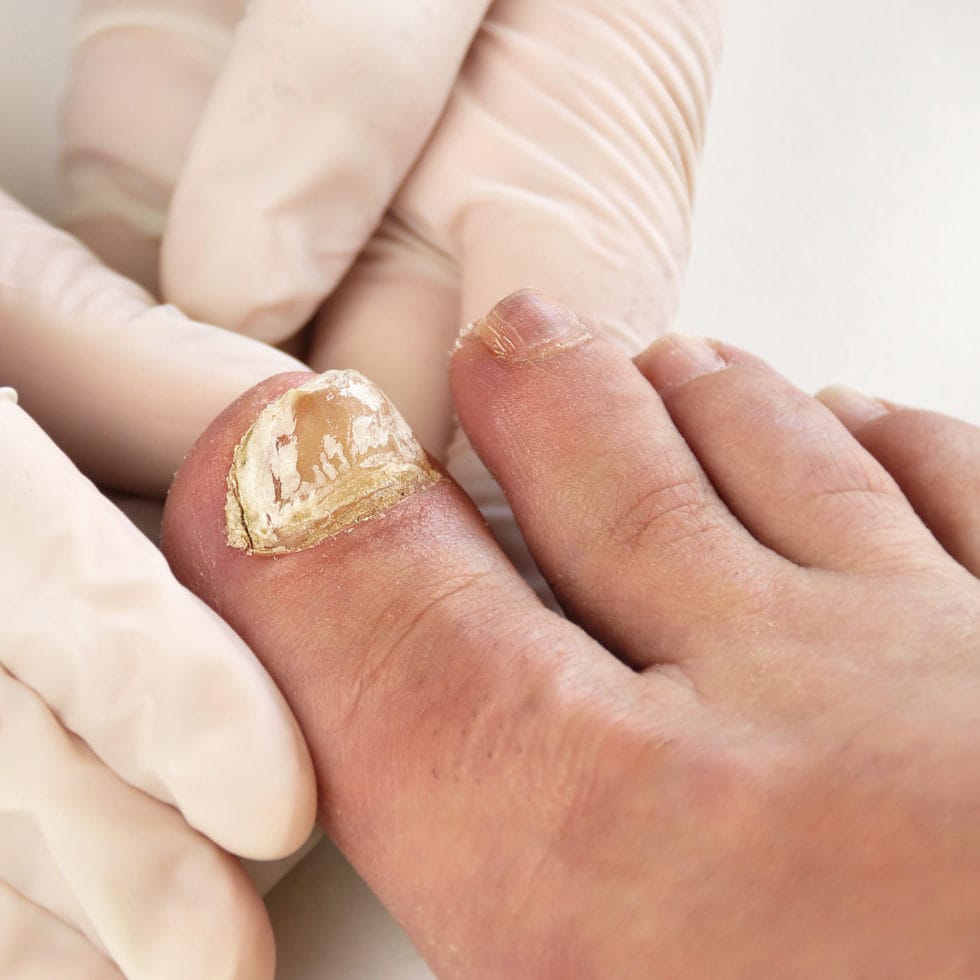Fungus Doctor

Toe Fungus Doctor Has Solutions!
Table of Contents
Toenail fungus infections are a common foot health problem and can continue for years without ever causing pain. The disease, characterized by a change in a toenail’s color, is often considered nothing more than a flaw or imperfection. If it’s left untreated, however, it can cause more serious problems.
Toenail fungus, also referred to as onychomycosis, is an infection underneath the surface of the nail, which may also break through the nail. It’s often accompanied by a secondary bacterial and/or yeast infection affecting the nail plate, which ultimately can lead to difficulty and pain when walking or running.
Symptoms May Include:
- Discoloration
- Brittleness
- Loosening, thickening, or crumbling of the nail
Toenail fungus is caused by a group of fungi, called dermophytes, that easily attack the nail and thrive on keratin, the nail’s protein substance. In some cases, when these tiny organisms take hold, the nail may become thicker, yellowish-brown, or darker in color, and foul smelling.
Nail bed injury may make the nail more susceptible to all types of infection. Those who suffer chronic diseases, such as diabetes, circulatory problems, or immune-deficiency conditions, are especially prone to toenail fungus. If basic foot care guidelines are followed, you more than likely can avoid most common foot fungus problems.
Some Best Practices To Prevent Toenail Fungus Are:
Use proper hygiene and regularly inspect your feet and toes.
- Keep your feet clean and dry.
- Wear shower shoes in public facilities whenever possible.
- Clip nails straight across so that the nail does not extend beyond the tip of the toe.
- Use a quality foot powder (talcum, not cornstarch) together with shoes that fit well and are made of materials that breathe.
- Avoid wearing excessively tight hosiery, which promotes moisture.
- Wear dry cotton socks, and change them two or three times a day if necessary.
- Wear dry shoes that allow air to circulate around your feet (tight, enclosed, moist shoes contribute to toenail fungus infections).
- Disinfect home pedicure tools and make sure the tools used in salons have been cleaned properly.
- Don’t share shoes or socks with others.
- Don’t share nail clippers or nail files with others.
Options For Toenail Fungus Treatment
Toenail fungus treatment options, depending on the type of infection you have and the severity, include:
Laser treatment that uses a laser light beam to penetrate the nail bed and kill the pathogens embedded in the nail causing the toenail fungus. This is the most effective method for toenail fungus treatment.
- Over-the-counter liquid antifungal agents that are applied directly to the nail.
- Oral medications in the form of pills that kill the fungus by entering the blood stream.
- Debridement which is when the diseased nail matter and debris is removed.
In severe cases, surgical toenail fungus treatment may be required to remove the entire infected nail. Permanent removal of a chronically painful nail, which has not responded to any other treatment, permits the fungal infection to be cured and prevents the return of a deformed nail. Cited www.APMA.org
Seeking Treatment
If you’ve been searching for a Fungus Doctor for your foot needs, take time to meet with the Podiatry Group of Georgia. Our doctor has the experience and knowledge you need to help your feet and ankles feel their best. Give us a call today and set up an appointment for your initial consultation. Call us today!
Call Our Marietta, Georgia Office Today at 404-806-3731 or Book your appointment online now!
Serving Atlanta and Marietta Area!
